Peanuts
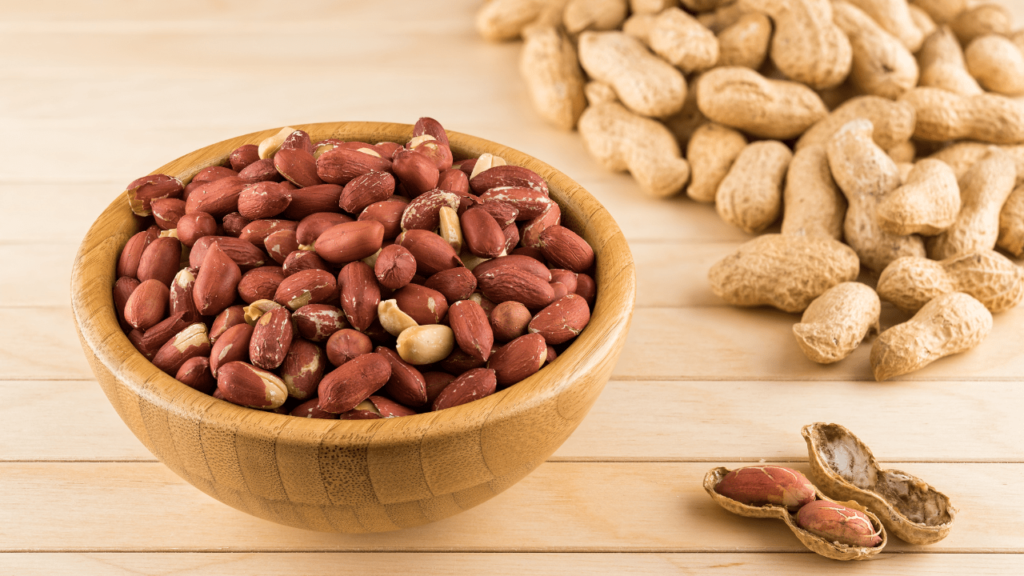
Peanuts are a great source of plant-based proteins, fiber, as well as various vitamins and minerals. Although peanuts are commonly referred to as nuts, they are actually legumes that grow underground. They possess a hard shell with two seeds inside. Peanuts are packed with beneficial nutrients such as protein, healthy fats, fiber, vitamins, and minerals, including antioxidants that help safeguard our cells. You can consume peanuts in various forms such as roasted, boiled, or as peanut butter. They are used in a wide range of foods and provide both excellent flavor and health benefits.
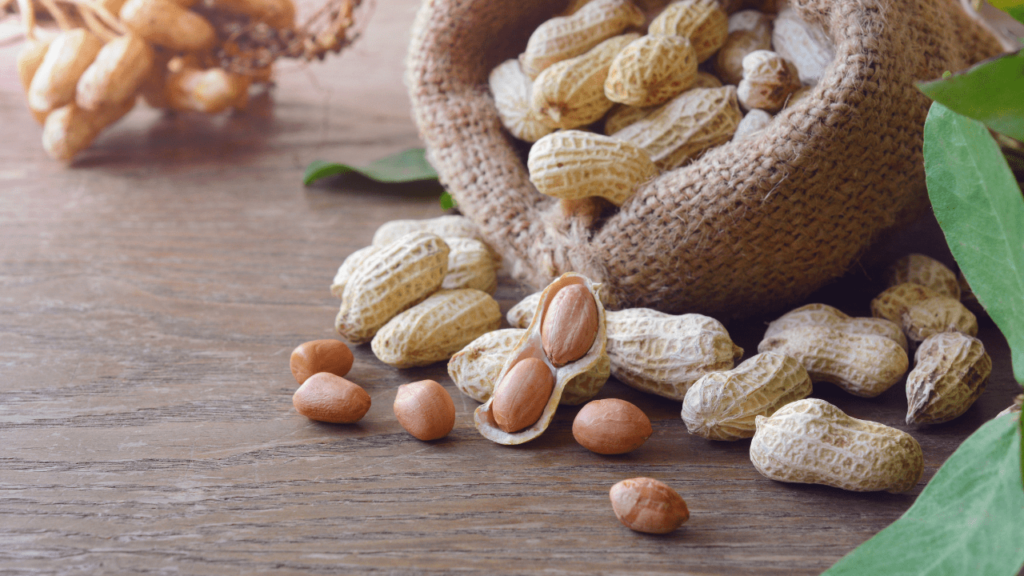
How do Peanuts grow?
Peanuts, which are actually legumes and not nuts, grow underground and provide excellent flavor along with health benefits. The process starts by planting peanut seeds in well-drained soil, which germinate after a few weeks and start to grow into yellow-flowered plants. These flowers eventually bend down and bury themselves in the soil, where the peanuts begin to develop on pegs produced by the self-pollinated flowers. As the pegs elongate and push further into the soil, the peanuts continue to mature and grow larger underground. Once the peanuts are fully grown, they are harvested by digging them up.
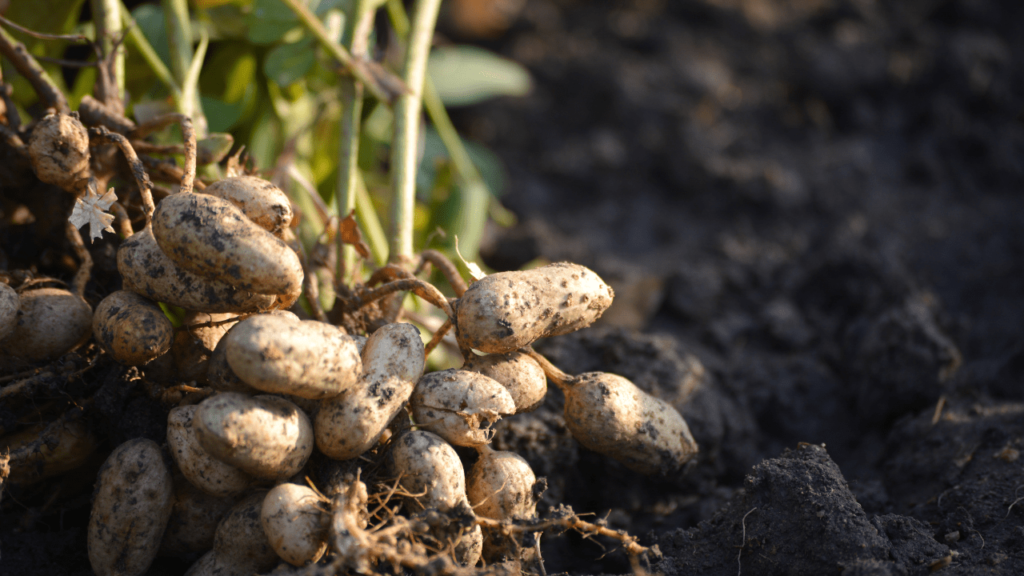
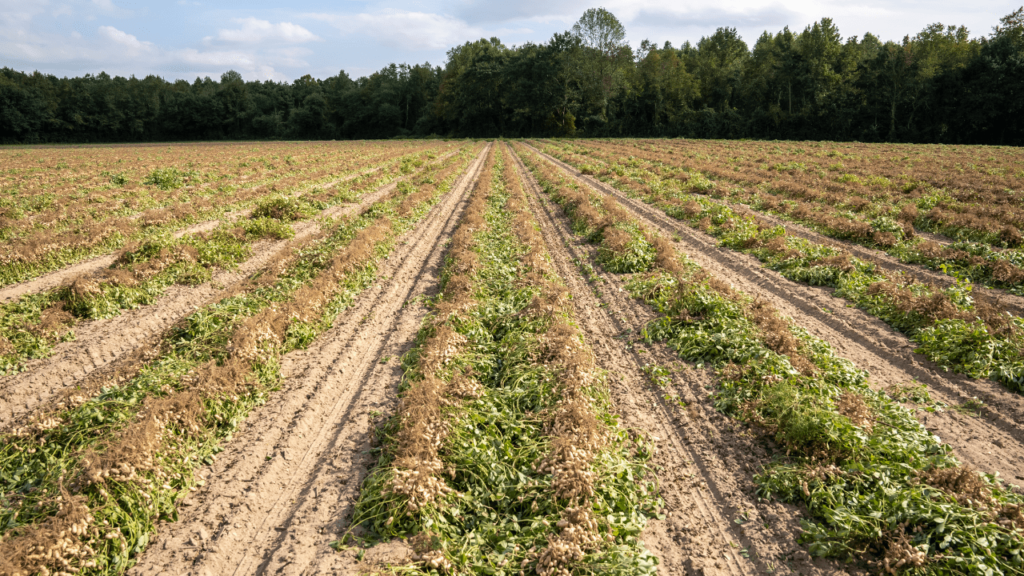
10 Benefits of peanuts
Protein source
Peanuts are an excellent source of protein as they contain all 20 amino acids our body needs. With 25.8 grams of protein per 100 grams, peanuts make a great choice for a protein-rich diet.
Has heart-protective nutrients
Peanuts are packed with protective nutrients such as magnesium, copper, and a healthy ratio of fats and antioxidants. They are also high in monounsaturated fats, protein, and fiber which help control cholesterol levels and reduce the risk of heart diseases. Incorporating peanuts into your diet can lower the risk of developing heart disease and promote overall heart health.
Help to lose weight
Nuts intake can lower heart disease risk and promote overall health by reducing low-density lipoprotein (LDL) cholesterol. Additionally, peanuts can aid in weight loss despite being high in calories, especially when consumed as a snack.

Manage blood sugar level
Consuming peanuts can lead to a greater feeling of fullness during a meal, which can eventually aid in weight loss by reducing appetite. Peanuts are also a great source of fuel for people with diabetes, as they do not cause significant spikes in blood sugar levels after consumption. Peanuts can help regulate blood sugar levels in several ways. Firstly, they have a low glycemic index, meaning that they cause a slower rise in blood sugar levels compared to high-glycemic foods, preventing spikes and crashes in blood sugar. Secondly, peanuts are rich in healthy fats, protein, and fiber, which can slow down digestion and the absorption of sugar into the bloodstream, providing a more steady release of energy. Lastly, the combination of protein, fats, and fiber in peanuts can help you feel fuller for longer periods of time.

Reduce the risk of strokes
Eating peanuts can have a positive impact on your health by reducing the risk of cardiovascular diseases, including stroke. Peanuts are a good source of heart-healthy monounsaturated fats that can help lower bad cholesterol levels. They also contain antioxidants like resveratrol, which is associated with improved cardiovascular health. However, stroke prevention is influenced by various factors, including overall diet and lifestyle choices. To stay healthy and prevent stroke, it is best to maintain a balanced diet, exercise regularly, and consult with a healthcare professional for personalized advice.
Promotes the gut health
Maintaining a healthy gut is crucial for overall well-being. Peanuts can help promote gut health in a few ways. Firstly, they are rich in dietary fiber which aids in digestion and ensures regular bowel movements, preventing constipation. Secondly, peanuts contain prebiotics that nourish the beneficial bacteria in our gut, promoting a healthy gut microbiome, which is important for immune function. Lastly, peanuts contain polyphenols, which have anti-inflammatory properties that help reduce inflammation in the gut, supporting a healthy gut environment. Adding peanuts to your diet can significantly contribute to maintaining a healthy digestive system.

Prevent the cancer
Peanuts contain resveratrol, phytosterols, and polyphenols, which have been linked to anti-cancer properties. These compounds can inhibit the growth of cancer cells and lower the risk of certain types of cancer. Peanuts are also a good source of antioxidants that protect cells from damage caused by free radicals, which may reduce the risk of cancer development. However, it is important to keep in mind that peanuts alone cannot prevent cancer, and a balanced diet, regular physical activity, and consulting a healthcare professional for personalized advice are the best ways to maintain good health. In addition, peanuts are a high source of protein and fiber which can help convert carbohydrates into energy, thus boosting energy levels. It is recommended to include peanuts as part of a healthy diet but only as a supplement to a well-balanced diet and lifestyle.
Boost Energy
Nuts play a significant role in maintaining a healthy diet and lifestyle. Peanuts, in particular, contain about 25% of the total calories in the form of unsaturated fats. The combination of fibre and protein also slows down the digestion process, which releases steady energy into the body.Moreover, peanuts can contribute to bone strength due to their nutrient content. They are a good source of magnesium, which is essential for healthy bones.

Bone Strength
Nuts contribute to bone strength due to their nutrient content. Peanuts, in particular, are a good source of magnesium, which is essential for bone health as it helps with the absorption and metabolism of calcium. They also contain phosphorus, another mineral important for maintaining strong bones and teeth. Additionally, peanuts provide protein, which is crucial for the development and maintenance of bone tissue. Including peanuts as part of a balanced diet that includes other bone-healthy foods can help support overall bone health.
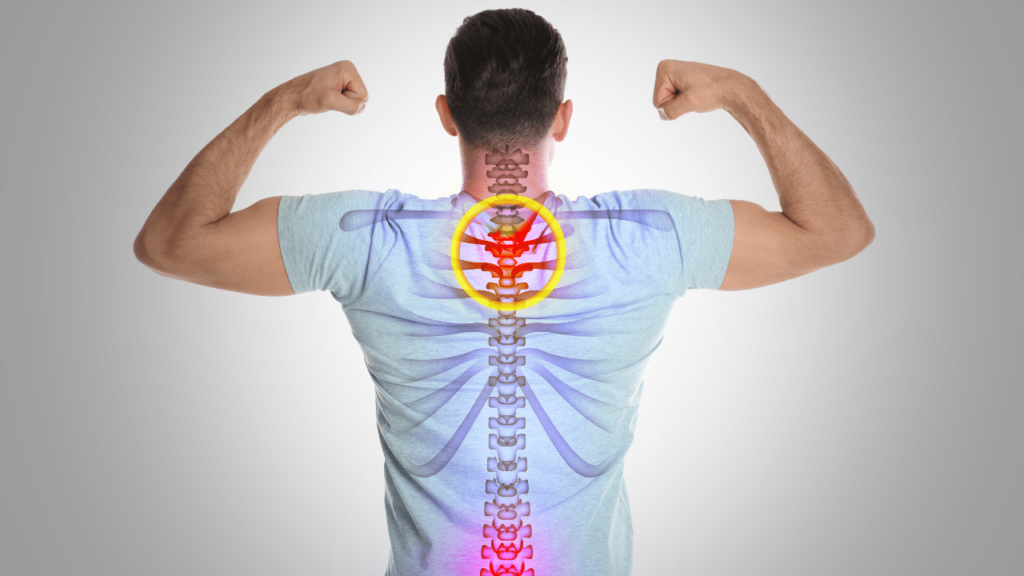
Improve Skin Health
Maintaining bone strength and skin health is crucial for overall well-being. Peanuts can be a valuable addition to your diet as they contain essential nutrients like vitamin E, a potent antioxidant that protects the skin from damage caused by free radicals, which are known to cause premature skin aging and other skin issues. Peanuts also contain biotin, a type of B vitamin, that helps maintain healthy skin by keeping it moisturized and promoting a clear complexion. Furthermore, the healthy fats present in peanuts can nourish and keep the skin supple. However, it’s important to remember that maintaining overall skin health requires a combination of factors, including a balanced diet, proper hydration, skincare routine, and sun protection. So, including peanuts in your diet can be a healthy choice to improve your skin health, but make sure to follow other healthy habits too.

Peanut Oil
Incorporating peanut oil into your diet can be a healthy choice to improve your skin health. However, it is important to follow other healthy habits as well to achieve a well-rounded approach to skincare. Peanut oil has several benefits, as it is rich in heart-healthy monounsaturated fats. Using peanut oil in cooking can help lower bad cholesterol levels and reduce the risk of heart disease. It also contains vitamin E, which is an antioxidant that helps protect cells from damage. Peanut oil has a high smoke point, making it suitable for high-heat cooking methods like frying and stir-frying. Moreover, its mild flavor can enhance the taste of dishes without overpowering them. Additionally, peanut oil can be used topically as a moisturizer.
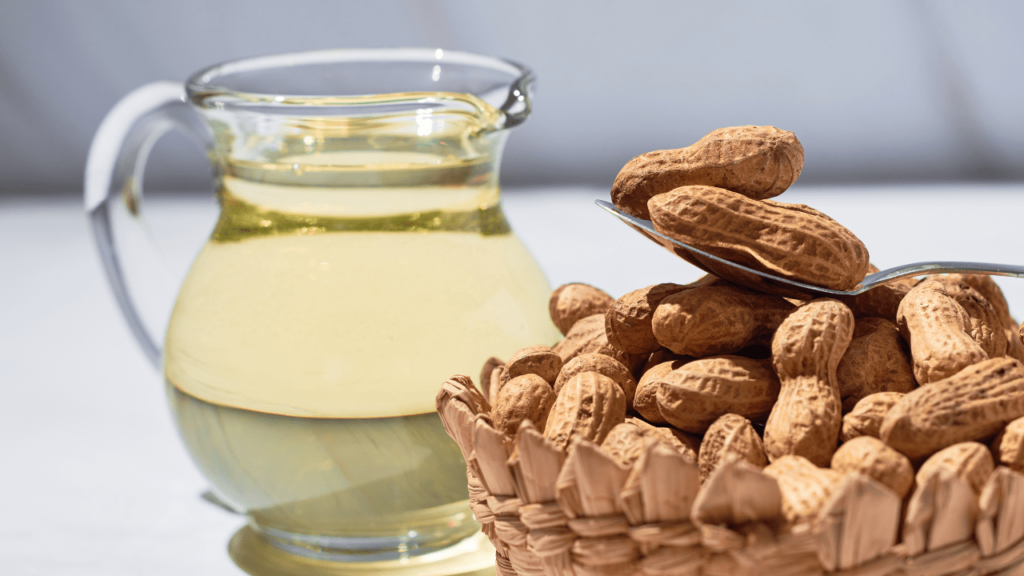
Peanut Butter
Peanut oil is a versatile ingredient that can be used topically as a moisturizer for the skin and hair. However, it should be used in moderation as it is high in calories. Enjoy the benefits of peanut oil in your cooking and skincare routine.Peanut butter is a delicious creamy spread made from roasted peanuts. To make peanut butter, peanuts are first roasted to bring out their natural flavors, and then they are ground into a smooth paste. Some varieties of peanut butter may include additional ingredients such as salt, sugar, or oil for added flavor and texture. Peanut butter is a versatile ingredient that can be used in many ways.
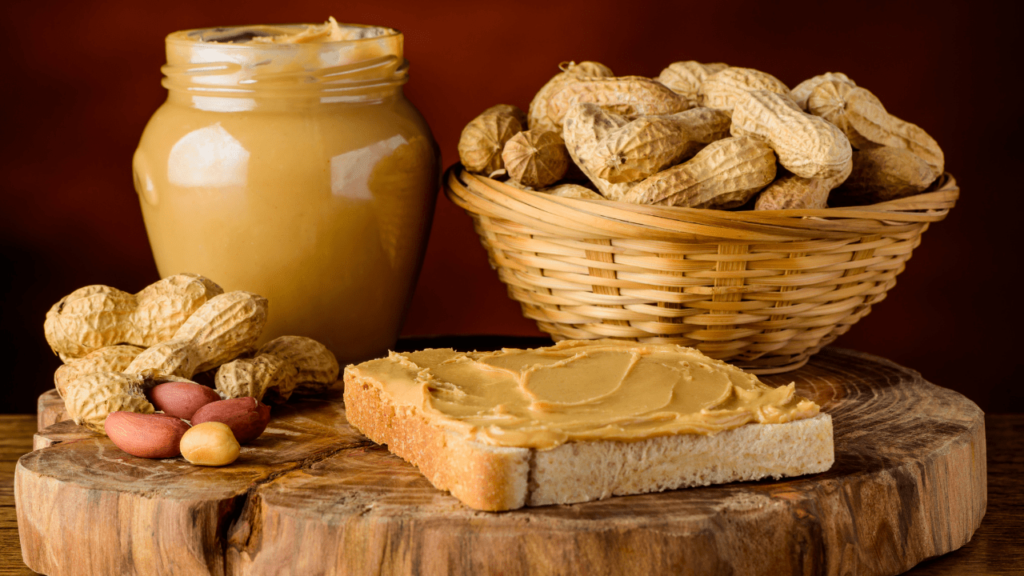
George Washington Carver, a scientist and inventor, discovered over 300 uses for peanuts, including peanut butter..